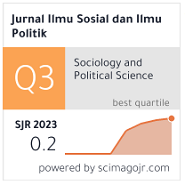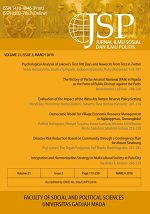Continuities of Public Service Innovations (PSIs) in Indonesia's Local Governments' Health Services: Whose Initiative Has A Higher Success Rate?
Pratiwi Pratiwi, Shafiera Amalia, Agus Wahyuadianto, Masrully Masrully, Candra Setya Nugroho
Abstract
PSIs have transformed better public services and increased public values. However, previous studies showed public servants saw PSIs as risky interventions because of the perception of uncertain outcomes, little support, not being rewarded when succeed, challenging incumbent culture, and negative public scrutiny when PSIs fail. Therefore, the perception of risks led to risk-averse behaviour in public service, incremental innovations, and innovation discontinuity. Continuities in PSIs have not been sufficiently investigated. Earlier studies on PSIs’ continuity have focused on leadership, engagement, collaborations, and organizational cultures in developed countries. However, the mechanism of engagements, collaborations, organizational culture, and leadership types are unclear. This study aimed to investigate the characteristics of long-term PSI in an Indonesian context where different authorities are exercised. This case study analysed and compared 11 PSIs in health services that were implemented by staff and formal leaders in Indonesia. The findings indicated that staff-initiated PSIs appeared to be triggered by community needs, use routine visits as a mechanism of collaboration, and engage more stakeholders than the other type. Staff-initiated PSIs needed more formal team assignments. Furthermore, staff-initiated PSIs strengthened social capital and decreased community health problems. On the other hand, PSIs that were initiated by formal leaders were more likely to be stimulated by formal antecedents such as the low achievement of development targets. Formal leaders-initiated PSIs also used capacity development programs to collaborate and increase the achievement of development targets. A novel finding as the addition of previous studies is that collaborating with other existing programs contributes to PSIs’ continuity. The managerial implication of this study encourages managers to stimulate front-liners in initiating PSIs.
Keywords
Public Sector Innovations; Community Health Services, Continuity, Staff, Formal leaders






















